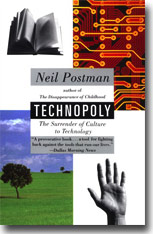
 Technology
Technology
possesses a powerful capacity to reshape the user:
That is because of the lasting partnership exerted between the tool user and the implements she uses to accomplish a task and more importantly to earn a living or survive.
"To every Old World belief, habit, or tradition, there was still is a technological alternative. To prayer, the alternative is penicillin; to family roots, the alternative is mobility; to reading, the alternative is television; to restraint, the alternative is immediate gratification; to sin, the alternative is psychotherapy; to political ideology, the alternative is popular appeal established through scientific polling."
p. 54.
Since tool complexes can shape entire populations, the many consequences of the way devices and instruments alter our expectations includes acclimation.
"Technopoly deprives us of the social, political, historical, metaphysical, logical, or spiritual bases for knowing what is beyond belief. This is especially the case with technical facts."
p. 58.
People become accustomed to technological capabilities and may adjust everything from personal to political relations to accommodate effective continuing use of a valued tool or set of utensils.
Psychologically, behaviorally speaking, driving an automobile is the most complex psycho-motor function most people ever perform. Tools condition us; as we use them we adjust our behavior.
"John Watson, the founder of behaviorism, showed that free will was an illusion and that our behavior, in the end, was not unlike that of pigeons."
Postman, pp. 54-55.
Physically, mechanized and automated systems (machine tools) reduced the differences in demonstrable strength between genders needed to run machinery. Yet, women are paid less than men to perform similar tasks.
"True Deity became mechanism,"
Thomas Carlyle, quoted, p. 38.
"Technical machinery is essential to both the bureaucrat and the expert and may be regarded as the third mechanism of information control."
p. 89.
Socially, technology redefines relations among people; railways, telephone, internet, cellular phones, cameras, radios, creating a sort of distance or gulf between people as users become ever more attached, if not intimate with their personal appliances. Meaning is shifted by the use of machinery with regard to work we do and the products we make and use.
"The thrust of a century of scholarship had the effect of making us lose confidence in our belief systems and therefore in ourselves. Amid the conceptual debris, there remained one sure thing to believe in–technology."
p. 55.
Ethically, tools dictate decisions over prolonging or enabling life and hastening death. Genetically modified organisms, nanotechnology, and genetic engineering raise fears of miniature monsters. But these moral changes began earlier with agriculture and certainly with the spread of explosives.
"Whether or not it draws on new scientific research, technology is a branch of moral philosophy, not science."
Paul Goodman, quoted on prelude page.
"But any conception of God's design certainly lost much of its power and meaning and with that loss went the satisfaction of a culture in which moral and intellectual values were integrated."
p. 38.
Postman's arguments–Origins of how there is no opposition to technical decision making.
Tools to Technocracy
From Technocracy to Technopoly
An improbable world
Broken Defenses
Invisible technologies
Scientism
Uninformed symbolism
Thesis
Pursell | Pacey–Meaning | Pacey | Head | Tenner | Postman–Tech | Postman–Television | Eberhart | Snow | Kaku
Technology: A powerful capacity